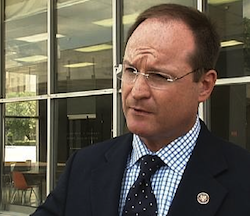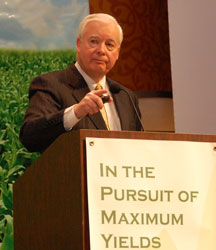 Leaders in the world’s advanced ethanol industry announced today that they are joining with the Renewable Fuels Association (RFA) to form the Advanced Ethanol Council (AEC). The new council will be focused on accelerating the commercialization of advanced ethanol “through visionary public policies that unleash the full potential of these advanced technologies and launch new market opportunities for ethanol.”
Leaders in the world’s advanced ethanol industry announced today that they are joining with the Renewable Fuels Association (RFA) to form the Advanced Ethanol Council (AEC). The new council will be focused on accelerating the commercialization of advanced ethanol “through visionary public policies that unleash the full potential of these advanced technologies and launch new market opportunities for ethanol.”
The AEC represents a wide range of advanced ethanol technologies utilizing feedstock from grasses and corn stalks to wood waste, municipal solid waste and algae to produce ethanol. The industry leaders founding the AEC include Abengoa Bioenergy , BlueFire Renewables, Coskata, Enerkem , Fulcrum BioEnergy, Inbicon, Iogen, Mascoma, Osage Bio Energy and Qteros.
“Advanced ethanol production and use is a critical component of America’s strategy to become more energy self‐reliant,” said Mascoma Chief Executive Officer Bill Brady, who will serve as Chair of the AEC. “New ethanol technologies will dramatically increase transportation fuel security, create new jobs, and diversify the feedstocks that can be processed into transportation fuels. Together with existing biofuel production, advanced ethanol will dramatically reduce America’s dependence on imported oil and provide Americans with more control over their energy future. As world events have demonstrated, the need for secure alternatives to imported oil is immediate. Members of the AEC are excited to join with the RFA and begin writing the next chapter in American ethanol.”
“American ethanol production is one of the most dynamic industries anywhere in the world,” said RFA President and Chief Executive Officer Bob Dinneen. “The innovative companies founding the AEC are leading the evolution of domestic ethanol production to include a vast array of feedstocks. The RFA is proud to join with the members of the AEC and continue its work building a bigger and broader American ethanol industry.”
The AEC has elected Brooke Coleman as Executive Director. Coleman has been the driving force behind numerous advocacy efforts to protect and expand markets for biofuels, promote advanced biofuels and reduce America’s dependence on foreign oil, while simultaneously addressing environmental concerns.
Joining Bill Brady as Vice Chairs of the AEC are Chris Standlee, Executive Vice President of Abengoa Bioenergy and John McCarthy, Chief Executive Officer of Qteros.





 There are renewable winners and losers in the FY2012
There are renewable winners and losers in the FY2012 



 In its global annual ethanol production forecast released today, the GRFA forecasts ethanol production to hit 88.7 billion litres in 2011, up three percent from 85.8 billion litres in 2010. Global production has now surpassed 550 million barrels of ethanol per year according to data compiled by F.O. Licht.
In its global annual ethanol production forecast released today, the GRFA forecasts ethanol production to hit 88.7 billion litres in 2011, up three percent from 85.8 billion litres in 2010. Global production has now surpassed 550 million barrels of ethanol per year according to data compiled by F.O. Licht. At a recent GROWMARK
At a recent GROWMARK